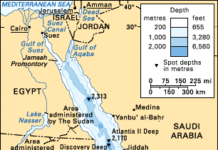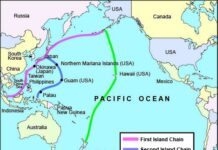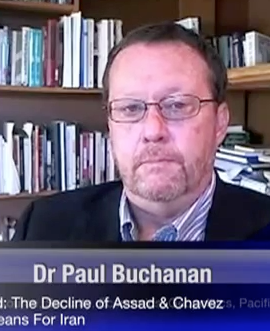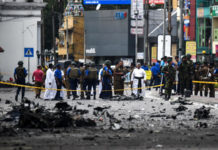New Zealand Foreign Affairs – Gateway Resource
Please Note: The following information is raw data electronically collected from New Zealand Ministry of Foreign Affairs. – 36th Parallel Assessments.
NZ Security Risk Assessments:
- New Zealand Foreign Affairs Alerts
- New Zealand Embassies Abroad
- Travel Advisories By Country
- Travel Advisories By Extreme Risk Score
- Travel Advisories By High Risk Score
NZ Foreign Affairs Statements:
[RSSjb feed=”http://feeds.feedburner.com/beehive-govt-nz/portfolio/foreign-affairs” num=”7″ pubdate=”true” excerpt=”false” charex=”250″ list=”ul” pubauthor=”false”]
[RSSjb feed=”http://feeds.feedburner.com/beehive-govt-nz/portfolio/pacific-island-affairs” num=”7″ pubdate=”true” excerpt=”false” charex=”250″ list=”ul” pubauthor=”false”]
New Zealand Relations with other countries:
On behalf of the government, the Ministry of Foreign Affairs and Trade interacts with other goverments to promote New Zealand’s interests, taking into account New Zealand’s security, political, trade and economic objectives.
To find out more about New Zealands relations with other countries and territories, you can select the appropriate region below or use the country/territory locator.
Significant Relationships:
Australia
The relationship with Australia is New Zealand’s closest and most significant. It is underpinned by geography and shared historical linkages, values and institutions, and substantial people-to-people links. The relationship encompasses close cooperation, on trade and economic issues, defence and foreign policy, but also extends across the range of government activities. Australia and New Zealand work closely on a wide variety of foreign policy and trade issues. This is particularly so in the South Pacific, East Asia and in multilateral organisations, such as the United Nations and the World Trade Organisation.
This uniquely close relationship is supported by extensive bilateral political engagement, and the work of senior business, community and academic leaders, who play an important role in exploring the possibilities for further developing the already close relationship.
Migration, trade and other people-to-people linkages have also played a key role in shaping this close relationship and the robust trans-Tasman sense of identity. This tradition continues today with almost two million short term visits across the Tasman each year. There are also substantial resident populations of New Zealanders in Australia, and of Australians in New Zealand, furthering the substantial people-to-people links that we already share.
Trade and Economic Links
New Zealand and Australia have one of the closest and broadest economic and trading relationships of any two countries. These links are underpinned by the Australia New Zealand Closer Economic Relations Trade Agreement (Closer Economic Relations, or CER), and more recently by the drive to further expand trade economic integration through the ambitious Single Economic Market (SEM) agenda. More
Political Links
The political relationship with Australia is better developed and more extensive than with any other country. Political engagement includes a schedule of regular high-level meetings, including annual meetings of Prime Ministers, and an extensive array of other contact. More
Defence Links
Australia is New Zealand’s closest and most important security partner. The two countries have a long tradition of cooperation in defence. More
People to People Links
People-to-people links, and the strong familial ties and friendships that go along with them, have helped to shape a robust sense of trans-Tasman identity. Trans-Tasman freedom of movement is a key element in the Australia New Zealand relationship. More
Australia Information Paper
New Zealand representation in Australia
New Zealand has a High Commission in Canberra. We also have Consulate-General offices in Sydney and Melbourne. The New Zealand Immigrations service, Passport office, Police, Customs, New Zealand Trade and Enterprise and Tourism New Zealand all have a presence in the Sydney office.
Travel advice
Read our travel advisory for Australia [external link]
Common Bilateral Acronyms
Pacific
The Ministry’s Pacific Division manages New Zealand’s bilateral and multilateral relationships in the South Pacific region. The Division is involved in a wide range of issues including political and economic relations, trade relations, defence and regional security, environment and fisheries management, and disaster relief assistance.
Pacific information papers
We provide key data, political and economic information and explain New Zealand’s bilateral relationship with the following countries and territories in the Pacific:
- Pacific Islands Forum – New Zealand hosted the 42nd meeting, 6th – 9th September 2011
- Pacific Snapshot Seminar, Auckland, 19 November 2009 – Booklet (PDF 350KB)
- Informal Forum Trade Participants Meeting, 8-9 May 2009, Auckland
Fiji
Information on New Zealand and Fiji including:
- Press releases
- Frequently asked questions
- Travel sanctions against Fiji (Immigration New Zealand, PDF 55KB)
Key Pacific issues
- Trade – The Pacific is an important market, with New Zealand’s exports to the region now worth more than NZ$1 billion a year.
- Environment and the Oceans – Environment priorities for New Zealand in the Pacific include climate change, the protection of whales and concerns over the shipment of spent nuclear material through the region.
- Regional Security – Security has become a significant focus of the Pacific Islands Forum’s work in recent years.
- Fisheries – The Pacific is the world’s most significant tuna fishing area, valued at up to $US2 billion and supplying a third of world tuna production. Safeguarding and managing the region’s fish stocks is a major concern.
- Economic – Rapid population growth, pressure on resources, and weak economic growth present substantial risks for the Pacific region.
- Health and Social – The Pacific region faces a range of health challenges. In Polynesia “lifestyle” non-communicable diseases (NCDs – such as diabetes, cardio-vascular disease and some forms of cancer) are the major health concerns.
- Disaster relief – New Zealand responds to cyclones and other natural disasters in the Pacific. Pacific Division coordinates an Emergency Task Force that responds to natural disasters 24 hours a day, every day of the year.
Pacific
Security
There is an increased global risk of terrorism. No country is immune from a terrorist attack, and no person is immune from becoming a victim of an attack. Terrorists have little regard for civilian casualties and, in many cases, attacks are designed to maximise casualties.
Although New Zealand travellers are unlikely to be targeted deliberately, they are usually indistinguishable from any “Western” tourist, and frequent places where other Western tourists are found. This puts New Zealanders at the same risk as others.
Wherever you are, you should keep yourself informed about the latest alerts and stay aware of your surroundings in areas where large numbers of people congregate, such as shopping malls, markets, monuments, demonstrations and on any public transport.
Extreme risk
Destinations in the Pacific where we advise against all travel
None
High risk
None
Destinations in the Pacific where we advise against tourist and other non-essential travel
None
Some risk
Destinations in the Pacific where we advise caution
Fiji
Papua New Guinea
Solomon Islands
Vanuatu
There are New Zealand Embassies or High Commissions in
Cook Islands
Fiji
Kiribati
New Caledonia
Niue
Papua New Guinea
Samoa
Solomon Islands
Tonga
Vanuatu
TPP Talk
TPP by the numbers
25 November 2011
The current TPP membership accounts for a significant share of New Zealand’s trade – and the three countries signalling their interest in joining the negotiations would boost this even further.
Brunei – small yet significant
17 November 2011
Belying its small size, Brunei Darussalam has played an important role in New Zealand’s trade agenda. Brunei Darussalam has been an active participant in the TPP negotiations from the start.
TPP embassies meet in Washington DC
10 October 2011
Embassies from Trans-Pacific Partnership countries based in Washington DC meet monthly to share information and coordinate joint activities in support of the TPP negotiations.
Treaties and International Law
Treaties for which New Zealand is the depositary
New Zealand acts as the depositary, or administrator, for a number of international treaties more
Trade law and free trade agreements
The Trade Law Unit within the Legal Division of the Ministry provides legal advice and representation in various international trade fora more
Treaty making process
The Legal Division of the Ministry of Foreign Affairs and Trade oversees the process by which the New Zealand Government enters into, and withdraws from or denounces, treaties more
Law of the Sea and Fisheries
As an island nation surrounded by the world’s largest ocean and with a heavy reliance on shipping for our international trade, New Zealand has a strong interest in the effective regulation and peaceful management of the uses of the ocean more
International Humanitarian Law
International humanitarian law is also sometimes described as the “law of armed conflict” or the “laws of war”. It is a framework of rules that restricts the means and methods of warfare and protects people who are not participating in the fighting, in order to limit the effects of armed conflict for humanitarian reasonsmore
International Courts and Tribunals
As a small international player New Zealand places great importance on the international rule of law, supported by mechanisms to hold States to their international legal obligations and peacefully settle international disputes more
Private International Law
“Private international law” is a term used to refer to the rules that apply in cases concerning individuals or entities, which have a foreign element – such as, for example, where a New Zealand company enters into a contract in the United States with a company registered there and a dispute arises about the contractmore
Diplomatic Privileges and Immunities
Foreign diplomats in New Zealand and New Zealand diplomatic representatives working in New Zealand’s posts overseas are both protected by the rules of diplomatic immunity more
United Nations Security Council Sanctions
International law events
The Ministry participates in a wide range of legal meetings and conferences and assists with annual meetings of the Australian and New Zealand Society of International Law (ANZSIL) and the Pacific Islands Law Officers Network (PILON) more
APEC
“Advancing free trade for Asia-Pacific prosperity”

Deputy Prime Minister English with the Obama’s at the APEC Economic Leaders’ Meeting 2011
Recent Events
2011
- Deputy Prime Minister Bill English, Foreign Minister McCully and Trade Minister Groser attended the 19th APEC Economic Leaders’ meeting on 13 November in Honolulu, United States.
- Deputy Prime Minster English attended the Leaders’ meeting. Read the Honolulu Declaration -Towards a Seamless Regional Economy [external link].
- Ministers Groser and McCully attended the APEC Ministerial meeting on 11 November. Read the Ministerial statement [external link].
- Hon Hekia Parata attended the Women and the Economy summit in San Francisco on 16 September, 2011. Read the Beehive media release [external link].
2010
- APEC Energy Ministers’ Meeting 18 – 19 June 2010, Fukui Japan – Hon. Pansy Wong attended. [external link]
- Asia Pacific Regional Economic Integration Conference – 25 March 2010, Programme and presentations from the conference
APEC Background
APEC began in 1989 with 12 members and has now grown to 21.
APEC members are Australia, Brunei Darussalam, Canada, Chile, China, Hong Kong China, Indonesia, Japan, Korea, Malaysia, Mexico, New Zealand, Papua New Guinea, Peru, the Philippines, Russia, Singapore, Chinese Taipei, Thailand, the United States and Viet Nam.
APEC members are referred to as “Member Economies” because not all members are states and the APEC process is predominantly concerned with trade and economic issues.
APEC spans four continents and is home to 40 per cent of the world’s population. APEC accounts for close to 44 per cent of the world’s trade and 54 per cent of global GDP.
The focal point of APEC is its Annual Economic Leaders’ Meeting, the largest gathering of its kind in the region. The APEC process involves ministerial and officials’ forums covering a wide range of issues, including trade and investment, economic cooperation and counter-terrorism.
More Information
- What APEC does
- APEC’s goals and achievements
- Organisational structure of APEC
- Why APEC is important to New Zealand
- APEC: Frequently Asked Questions
- Information for New Zealand Businesses
- APEC Business Travel Card











